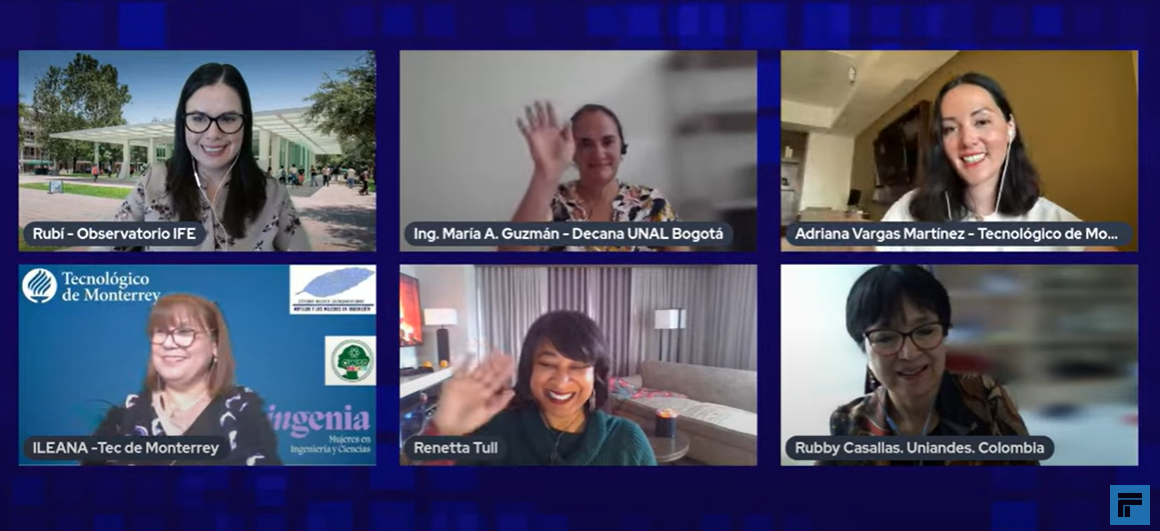In the last webinar of the Observatory of the Institute for the Future of Education, we had the opportunity to listen and learn about the experience of successful women who work in higher education, occupying management positions in Schools of Engineering and Sciences in Latin America and the United States. Constancy, perseverance, resilience, effort, and solidarity comprised the thread running through every testimony and advice shared by this incredible panel of women; despite all the obstacles, they have managed to move forward.
This webinar occurred within the framework of February 11, the Day of Women and Girls in Science, and March 8, International Women’s Day 2023, observing the theme established by United Nations Women, “Toward an inclusive digital world: Innovation and technology for gender equality.” Through this webinar, we seek to inspire young students, teachers, researchers, mothers, and fathers to foster the vocation, development, and advancement of girls and women in all areas of STEM,” commented Ileana Ruiz, professor at the School of Engineering and Sciences at Tecnologico de Monterrey.
Here I share a webinar summary of some of the most relevant quotations from our magnificent women-and-colleague panelists. To all of them, thank you very much.
- “As an engineering student, I was the only woman in many classes. For some reason, I felt obliged to know the correct answer when the teacher asked me something in class. Now I realize I was wrong because having the opportunity to learn from mistakes is also a woman’s privilege.” – Rubby Casallas Gutierrez, Dean of the Faculty of Engineering at the University of the Andes.
- “Don’t let any family member, friends, teachers, or anyone under any circumstances limit girls’ growth by telling them, “Math is not for women.” Girls and young women have the right to develop in science, technology, and mathematics if they so wish.” – Maria Guzman, Dean of the Faculty of Engineering of the National University of Colombia
- “We must be able to generate an environment free of gender violence. If you go through a situation in which you do not feel comfortable or are fearful, ask for help, express it, and talk about it. We must be empathetic and respect differences because they enrich us.” – Adriana Vargas, Associate Dean of Digital and Graduate Studies of the School of Engineering and Sciences at Tecnologico de Monterrey.
- “Fight for your dreams and goals. I have had several mentors throughout my career who helped me improve and grow. Share your dreams and projects with other senior female colleagues and ask them how you can improve what you are doing. Meet speakers and specialists who work on projects related to yours. It will greatly help you expand your vision and share your projects and what you want to do with them. It helps you focus your efforts.” – Renetta Tull, Vice Chancellor for Diversity, Equity, and Inclusion at the University of California, Davis.
- “At the University of the Andes, we created the MAAD (Mistreatment, Accostment, Aggression (threat) and Discrimination) protocol. We have zero tolerance for these behaviors in our academic community. We also generated a campaign called “It’s not normal.” For example, it is not normal for a male teacher to hug you. It’s not normal for your male colleagues to comment about how you dress. It’s a simple but well-thought-out campaign.” – Rubby Casallas Gutierrez.
- “Beware of “imposter syndrome,” that is, to think we are incapable of doing our jobs. Sometimes I find receiving congratulations or compliments regarding my good performance uncomfortable. This thought is wrong and not good. If people congratulate you on your work, it is because you’re doing things right. Trust in yourself.” – Maria Guzman.
- “The success factors that have influenced my professional career are being organized, disciplined, and having well-defined goals. However, my family’s support has been one of the most important, that of my husband and my parents, because I am also a mother of two teenagers, and their support network is fundamental.” – Adriana Vargas.
- “Promote a multicultural perspective of science within academic programs. Also, make sure to generate an environment of diversity and inclusion within the institution and encourage the representation of the diversity of the student body. – Renetta Tull.
- “The gender issue is not a women’s issue as it occurs in a broader context.” – Rubby Casallas Gutierrez.
- “In 2018, the National University of Colombia created the first prevention protocol against gender-based violence in the country. Although it was an advance then, this protocol must be updated now. Like any prevention protocol that is developed or any gender equality policy that is designed, we must rely on people with the necessary knowledge to help us develop an action plan. Also, we must recognize that we do not know everything, nor are we experts, especially on this subject” – Maria Guzman.
- “My dream or professional goal is one day to be president of Tec de Monterrey. Besides leadership positions, the academic and managerial positions I have achieved during my career are ones of service. For me, being able to help others, empower my work teams, help make school better, and generate better work environments for women is very important. This whole experience is part of a process to reach my goal.” – Adriana Vargas.
- “Ask a colleague to review your CV or LinkedIn profile. They can advise you on how to improve these, and surely you can improve them with their feedback.” – Renetta Tull.
All the experienced presenters of this webinar made us reflect on the role that each of us can play in the activities we conduct in our workplaces to promote workspaces free of gender violence and promote inclusion.
One of the Sustainable Development Goals (SDGs) is gender equality, and for several decades institutions, companies, organizations, and governments have been working to different degrees to promote this culture. Today, however, women face difficulties ascending to managerial positions in public and private settings. The lack of representation of women in areas and jobs in engineering, science, and technology affects them as a factor that reduces the possibility of finding women in managerial and leadership positions.
Some of the factors contributing to gender disparity in academic and STEM areas are 1) the lack of female role models and appropriate mentors for the successful socialization of female faculty, 2) the lack of peer support for the advancement of women through academic ranks and their selection for executive administrative functions on an equal footing with their male counterparts; and 3) implicit bias, as well as the acquisition of negative stereotypes.
Therefore, it is relevant to disseminate these testimonials and trajectories of women who stand out by their leadership despite facing a complex environment with obstacles impacting universities in Latin America and Schools of Engineering and Sciences. They also shine because of their activities to promote the culture of gender equality and inclusion through national and international initiatives.
Relive this webinar. If your native language is not Spanish, you can turn on this article’s YouTube subtitled instant translation. To activate this option, select the Subtitles option on YouTube (Spanish subtitles will appear), then select the Settings ->Subtitles -> Automatically Translate option and choose the preferred language.
Webinar organizers:
María Ileana Ruiz Cantisani, Laura Eugenia Romero Robles, and Vianney Lara Prieto from the School of Engineering and Sciences at Tecnologico de Monterrey
Observatory of the Institute for the Future of Education of Tec de Monterrey.
Host of the Observatory IFE, Rubí Román, Editor of the Edu Bits articles and producer of the Observatory webinars.
The speakers are Deans of Engineering Schools:
- Renetta Garrison – Vice Chancellor for Diversity, Equity, and Inclusion at the University of California, Davis.
- María Guzmán – Dean of the Faculty of Engineering of the National University of Colombia
- Adriana Vargas – Associate Dean of Digital and Graduate Studies, School of Engineering and Sciences at Tecnologico de Monterrey.
- Rubby Casallas Gutierrez – Dean of the Faculty of Engineering at the University of the Andes.
This article from Observatory of the Institute for the Future of Education may be shared under the terms of the license CC BY-NC-SA 4.0 
)
)


)